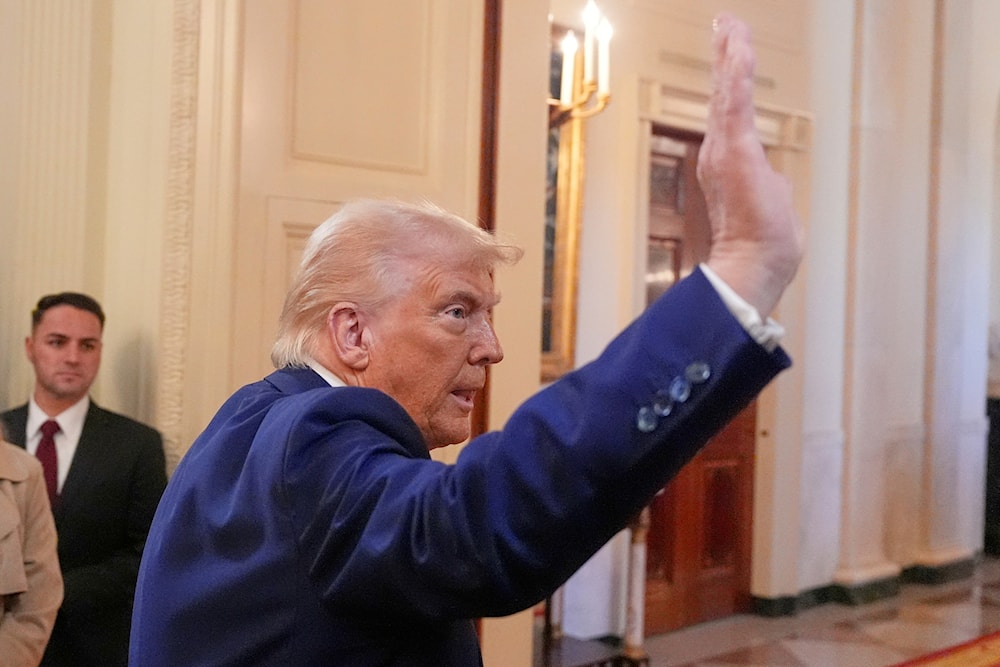Trump's new tariffs take effect, with 104% on Chinese goods
Trump’s sweeping tariff hikes—some exceeding 100% on Chinese goods—officially took effect Wednesday, intensifying the global trade war.
-

US President Donald Trump departs after an event in the East Room of the White House on April 8, 2025, in Washington. (AP)
US President Donald Trump’s harsh tariffs targeting dozens of countries officially took effect on Wednesday, with some duties on Chinese imports surpassing 100%, marking a significant escalation in the ongoing global trade war.
The introduction of sweeping 10% tariffs over the weekend already shook the global economy, and as of 12:01 a.m. (0401 GMT) Wednesday, tariffs on goods entering the US from exporters like the European Union and Japan increased even further.
China—America’s main economic competitor and key trade partner—has been hit the hardest. Since Trump’s return to the presidency, tariffs on Chinese products have climbed to 104%.
Trump said on Tuesday that his administration was pursuing "tailored deals" with trade partners, while the White House indicated that allies such as Japan and South Korea would be prioritized.
Top trade representative Jamieson Greer informed the Senate that Argentina, Vietnam, and the Israeli occupation government had shown readiness to reduce their tariffs.
Moreover, at a Republican dinner Tuesday evening, Trump said other nations were eager to reach agreements. "I'm telling you, these countries are calling us up kissing my ass," he said, adding that countries were "dying" to make a deal. However, Beijing has refused to back down, pledging to continue the trade war "to the end" and announcing retaliatory measures to protect its interests.
China's counter-tariffs—set at 34% on US goods—are scheduled to take effect Thursday.
Trump insists his strategy will bring back manufacturing jobs to the US by pressuring companies to move production stateside. However, many economists and business analysts remain skeptical, warning that the tariffs could drive up inflation and hurt consumers before any long-term benefits are seen.
Still, he stressed on Tuesday that the US is "taking in almost $2 billion a day" from the tariffs.
Trump: China 'wants to make a deal'
Trump unveiled a 34% additional tariff on Chinese goods, but after China countered with its tariff of the same amount on US products, Trump piled on another 50% duty.
Counting existing levies imposed in February and March, the cumulative tariff increase for Chinese goods during Trump's second presidency would reach 104%.
Trump has insisted the ball was in China's court, saying Beijing "wants to make a deal, badly, but they don't know how to get it started." Late Tuesday, Trump also said the United States would announce a major tariff on pharmaceuticals "very shortly". Separately, Canada said its tariffs on certain US auto imports will come into force on Wednesday.
China 'confident'
After trillions of dollars in market value were erased from global stock exchanges in recent days, Asian markets continued to slide on Wednesday—Hong Kong dropped over 3%, while Japan’s Nikkei index fell by 2.7%.
Currency markets also saw significant turmoil. The South Korean won hit its lowest level against the US dollar since 2009 earlier this week. Meanwhile, China’s offshore yuan declined to a record low against the dollar, as the country’s central bank devalued the currency on Wednesday for the fifth consecutive day, according to Bloomberg.
Oil prices tumbled, with West Texas Intermediate falling below $60 per barrel for the first time since April 2021.
To ease tensions, the European Union stepped in, as Commission President Ursula von der Leyen urged restraint during a call with Chinese Premier Li Qiang. She emphasized the importance of global economic stability and "the need to avoid further escalation," according to an EU statement.
Qiang told von der Leyen that China is prepared to endure the challenges, stating the country "is fully confident of maintaining sustained and healthy economic development." Meanwhile, the European Union—frequently criticized by Trump over its tariff policies—may announce its response as early as next week to the newly imposed 20% tariffs targeting its exports.
In response to US tariffs on steel and aluminum that went into effect last month, the European Union is preparing to impose retaliatory duties of up to 25% on a range of American products—including soybeans and motorcycles—according to a document reviewed by AFP.

 4 Min Read
4 Min Read










